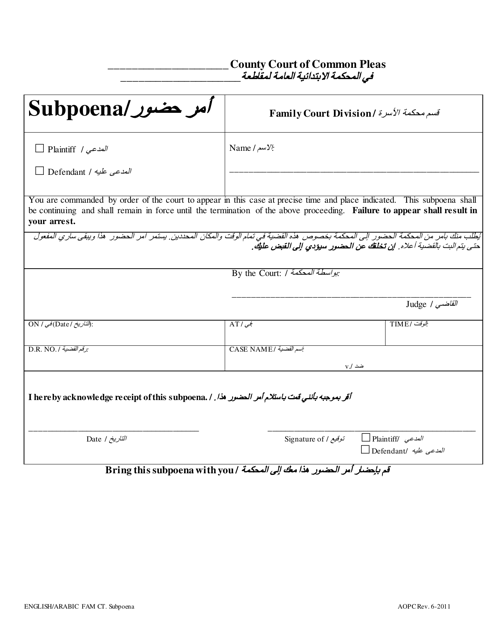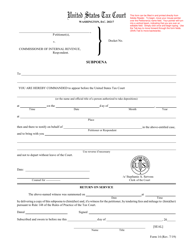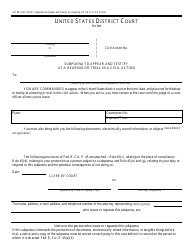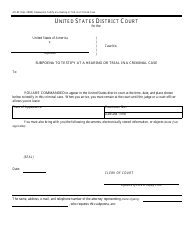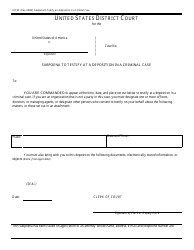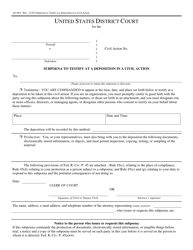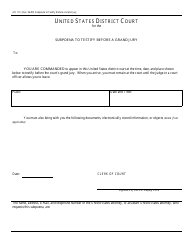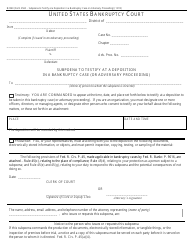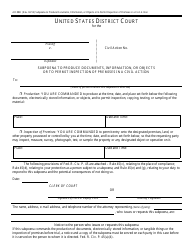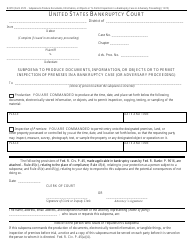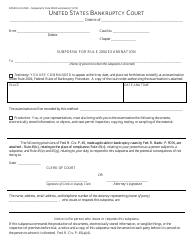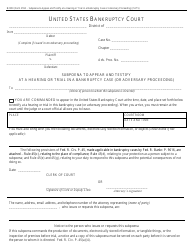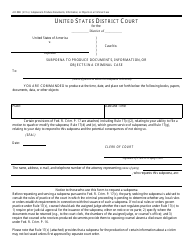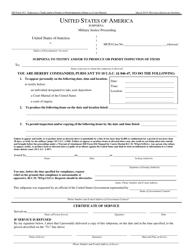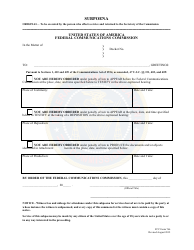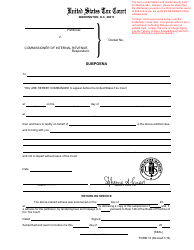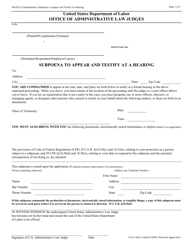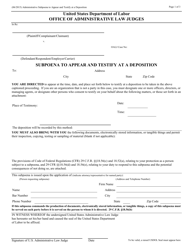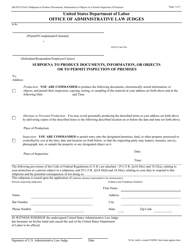Subpoena - Pennsylvania (English / Arabic)
Subpoena is a legal document that was released by the Pennsylvania Court of Common Pleas - a government authority operating within Pennsylvania.
FAQ
Q: What is a subpoena?
A: A subpoena is a legal document that requires a person to testify or provide evidence in a court proceeding.
Q: Who can issue a subpoena in Pennsylvania?
A: A subpoena in Pennsylvania can be issued by a court clerk, an attorney, or a judge.
Q: How do I respond to a subpoena?
A: If you receive a subpoena, you should comply with its requirements, such as appearing in court or providing the requested documents.
Q: Can I ignore a subpoena?
A: No, ignoring a subpoena can result in penalties, including fines or even imprisonment.
Q: What if I can't comply with the subpoena?
A: If you are unable to comply with a subpoena, you should contact the issuing party or your attorney to discuss possible alternatives.
Q: Can I be compensated for complying with a subpoena?
A: In Pennsylvania, witnesses may be entitled to receive a witness fee and reimbursement for certain expenses incurred while complying with a subpoena.
Q: Are subpoenas only used in court cases?
A: No, subpoenas can also be used in other legal proceedings, such as administrative hearings or arbitration.
Q: Do I need a lawyer if I receive a subpoena?
A: It is recommended to seek legal advice if you receive a subpoena to understand your rights and obligations.
Q: Can I challenge a subpoena in Pennsylvania?
A: Yes, you can challenge a subpoena in Pennsylvania if you believe it is unreasonable or unduly burdensome. Consult with an attorney to understand the specific steps for challenging a subpoena.
Q: Can I be punished for not complying with a subpoena in Pennsylvania?
A: Yes, failure to comply with a subpoena in Pennsylvania can result in penalties, including contempt of court charges.
Q: Is there a difference between a subpoena and a summons?
A: Yes, a subpoena is a document that requires a person's presence or the production of documents, while a summons is a document that initiates a legal action and informs a person of their obligation to appear in court.
Q: Are there any exceptions to responding to a subpoena in Pennsylvania?
A: Some privileges, such as attorney-client privilege or doctor-patient privilege, may exempt a person from the obligation to respond to certain questions in a subpoena.
Q: What happens if I don't receive a subpoena correctly?
A: If a subpoena is not properly served or delivered to you, you may not be legally obligated to comply with its requirements. Consult with an attorney to determine the validity of the subpoena.
Q: Can a subpoena be withdrawn or cancelled?
A: Yes, a subpoena can be withdrawn or cancelled by the issuing party or a court if there are valid reasons for doing so.
Q: What should I do if I receive a subpoena in a language I don't understand?
A: If you receive a subpoena in a language you don't understand, you should seek assistance from a qualified interpreter or translator to ensure you comprehend its requirements.
Q: Can I request a copy of the subpoena for my records?
A: Yes, you can request a copy of the subpoena from the issuing party or your attorney for your records.
Q: What are the consequences of non-compliance with a subpoena?
A: The consequences of non-compliance with a subpoena may include being held in contempt of court, facing fines, or even being subject to imprisonment.
Q: Can a subpoena be used to obtain personal records or documents?
A: Yes, a subpoena can be used to obtain personal records or documents if they are relevant to a legal proceeding.
Q: What rights do I have as a witness who receives a subpoena?
A: As a witness who receives a subpoena, you have the right to be treated fairly and to be compensated for your time and expenses incurred while complying with the subpoena.
Q: Can I refuse to testify in court if I receive a subpoena?
A: In general, you cannot refuse to testify in court if you receive a subpoena. Failure to comply may result in penalties.
Q: What should I do if I receive a subpoena by mistake?
A: If you believe you have received a subpoena by mistake, you should contact the issuing party or your attorney to clarify the situation.
Q: What types of cases commonly involve subpoenas in Pennsylvania?
A: Subpoenas are commonly used in various cases, including criminal cases, civil lawsuits, and administrative proceedings.
Q: Can I be fired from my job for responding to a subpoena?
A: Generally, an employer cannot fire an employee solely for responding to a valid subpoena. However, employment laws may vary, so consulting with an attorney is advisable.
Q: Can I be forced to testify against my spouse or family member?
A: In Pennsylvania, there are some spousal and familial privileges that may protect you from being forced to testify against your spouse or family member. Consult with an attorney to understand these privileges.
Q: Can I be forced to incriminate myself through a subpoena?
A: The Fifth Amendment of the United States Constitution protects individuals from being forced to incriminate themselves through a subpoena.
Q: How long do I have to respond to a subpoena in Pennsylvania?
A: The time to respond to a subpoena in Pennsylvania may vary depending on the specific circumstances and court rules. It is important to review the subpoena for any deadline mentioned and consult with an attorney.
Q: Can a subpoena be served by email or fax in Pennsylvania?
A: In Pennsylvania, a subpoena can be served by email or fax as long as certain requirements are met, such as consent from the person being served or compliance with court rules.
Q: What is the purpose of a subpoena duces tecum?
A: A subpoena duces tecum is a type of subpoena that specifically requests the production of documents or records.
Q: Does a subpoena guarantee my appearance in court?
A: A subpoena does not guarantee your appearance in court, but it legally requires you to appear or provide the requested documents.
Q: Can I be subpoenaed to testify in a case outside of Pennsylvania?
A: Yes, you can be subpoenaed to testify in a case outside of Pennsylvania if you have relevant information for the proceeding.
Q: Can I refuse to comply with a subpoena if it violates my privacy?
A: In some cases, you may be able to object to a subpoena if it violates your privacy rights. Consult with an attorney to understand your options.
Q: What happens if I am unable to locate the requested documents mentioned in the subpoena?
A: If you are unable to locate the requested documents mentioned in a subpoena, you should explain the situation to the issuing party or your attorney to explore possible alternatives.
Q: Can I be paid for my time if I am required to appear in court due to a subpoena?
A: In Pennsylvania, witnesses may be entitled to receive a witness fee for their time spent appearing in court due to a subpoena.
Q: Can I be punished for providing false or misleading information in response to a subpoena?
A: Yes, providing false or misleading information in response to a subpoena can result in penalties, including charges of perjury.
Q: What should I do if I have concerns about the information requested in the subpoena?
A: If you have concerns about the information requested in a subpoena, you should consult with an attorney to discuss the best course of action.
Q: Can a subpoena be withdrawn or cancelled after I have already complied with its requirements?
A: In some cases, a subpoena can be withdrawn or cancelled after you have already complied with its requirements. Consult with an attorney to understand the specific circumstances.
Q: Can a subpoena be used to obtain personal emails or other electronic communications?
A: Yes, a subpoena can be used to obtain personal emails or other electronic communications if they are relevant to a legal proceeding.
Q: Can I be forced to travel long distances to comply with a subpoena?
A: The court may take into consideration the burden of travel when issuing a subpoena, but in some cases, individuals can be required to travel long distances to comply with a subpoena.
Q: Are the rules for subpoenas different in different states?
A: Yes, the rules for subpoenas can vary from state to state. It is important to consult the specific laws and regulations of the state where the subpoena was issued.
Q: Can I be punished if I accidentally destroy or lose documents that were requested in a subpoena?
A: Accidental destruction or loss of documents may still result in consequences, such as court sanctions or negative inferences. Notify the issuing party or your attorney if this occurs.
Q: Can a subpoena be used to obtain my medical records?
A: Yes, a subpoena can be used to obtain your medical records if they are relevant to a legal proceeding.
Q: Can I be required to testify under oath if I receive a subpoena?
A: Yes, if you receive a subpoena, you can be required to testify under oath.
Q: Can I be forced to testify about information that is confidential or privileged?
A: In general, confidential or privileged information may be protected from being forced to be disclosed through a subpoena. Consult with an attorney to determine the applicability of any applicable privileges.
Q: Can I request to have a subpoena quashed or modified in Pennsylvania?
A: Yes, you can request to have a subpoena quashed or modified in Pennsylvania if you believe it is unreasonable or unduly burdensome. Consult with an attorney to understand the specific steps for making this request.
Form Details:
- Released on June 1, 2011;
- The latest edition currently provided by the Pennsylvania Court of Common Pleas;
- Ready to use and print;
- Easy to customize;
- Compatible with most PDF-viewing applications;
- Fill out the form in our online filing application.
Download a fillable version of the form by clicking the link below or browse more documents and templates provided by the Pennsylvania Court of Common Pleas.
